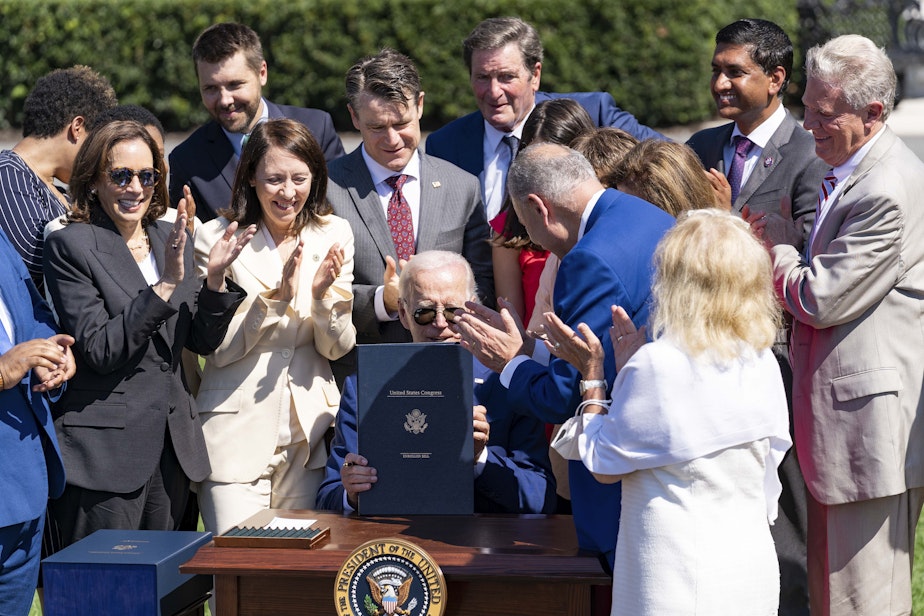What a new manufacturing act could mean for Washington state

Today, President Biden signed the CHIPS and Science Act.
It authorizes $250 billion to subsidize domestic production of semiconductors and fund research into new semiconductor technology.
Supporters say it will help deal with supply chain issues, and make the U.S. more competitive against foreign manufacturers. But not everyone's so sure.
Modern technology – from cars to cell phones to your roomba – rely on microchips. And the materials that make microchips possible? Those are called semiconductors. They’re the reason we don’t use vacuum tubes anymore – and the reason our computers can fit in the palm of our hands, instead of being the size of a studio apartment.
But you might've noticed that a lot of electronic gadgets are hard to buy right now.
Car manufacturers are hitting months-long wait times for chips – which means they can’t meet demand from consumers, and prices are going up. So today, President Biden signed a law aiming to fix that – the CHIPS and Science Act.
Sen. Maria Cantwell of Washington, who chairs the Committee on Commerce, Science, and Transportation, is one of the primary architects of the bill.
She said the funding provided by the act will help America catch up with international microchip and semiconductor producers.
"It's trying to address the fact that we have fallen in chip production in the United States," Cantwell said. "We're only producing about 12%, we used to be at 36%."
Short term, this bill is meant to expand factory production in the United States. Long term, it's about investing in research and development that will keep America on the cutting edge with chip and semiconductor technology.
Cantwell emphasized that the funding from the measure will stay with companies in the United States.
"As it relates to chip fabrication, there are requirements in the bill that says it has to stay in the United States, and you can't buy stock buybacks," Cantwell said. "The Secretary of Commerce is given the power to claw back the money, if necessary, to make sure that those activities are prevented."
But Professor Alan O. Sykes isn't sure that's a good thing.
"The great fear...of economists in this area is that when you subsidize things, you're going to be subsidizing investments that are not positive net present value, that are negative net present value, that wouldn't be made by private industry acting on its own," Sykes said. "And so you end up with inefficient, higher cost production than you would if you simply let the market work on its own."
Sykes, a professor of law at Stanford and a senior fellow at the Stanford Institute for Economic Policy Research, generally leans toward a laissez-faire, hands-off economic philosophy.
He argues that the pandemic drove greater demand for consumer electronics and exposed weaknesses in the supply chain, but that doesn't mean we should put the U.S. government's thumb on the scale to subsidize semiconductor manufacturing at home.
Sykes said the CHIPS Act is part of a shift to a more protectionist stance by the United States in recent years when it comes to manufacturing and trade. For example, the Ocean Shipping Reform Act – also championed by Sen. Cantwell – beefs up the regulatory agency that oversees U.S. ports, and requires foreign companies to ship U.S. products when they take shipping containers back from port instead of sending them away empty.
"My personal feeling is that letting the market sort these things out, by and large is the right way to go," Sykes said. "And the government micromanagement of supply chains in any industry is probably a mistake that's likely to be captured by interest groups with their hands out in Washington one way or another, rather than leading to the most efficient economically sensible approach."
But there are many groups cheering today's signing of the CHIPS Act.
"First and foremost for the nation just reinforces an awareness of how important semiconductor are in a really a broad range of industries," said Scott Keeney, CEO of nLight, a Vancouver, Washington based company that manufactures high-power semiconductor and fiber lasers.
Deloit R. Wolfe. Jr, President and Center Director of Impact Washington, agreed.
"For the state of Washington, I think it's really exciting times," Wolfe said. "We have always been known as a storied and historic role in manufacturing. I think this is going to help continue that journey in the state of Washington, whether it's in the semiconductor world or the aerospace world or the technology world."





